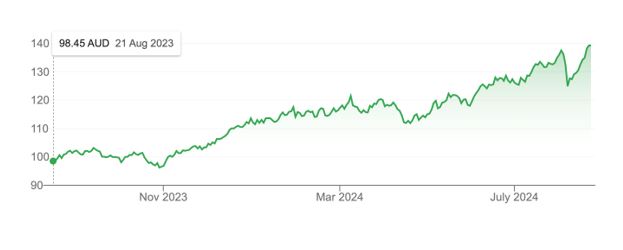

The old maxim of business was “cash is king” but in a post-Covid world, our big banks want to declare “the king is dead, long live the card!” However, even knowing that keeping cash in branches and ATMs costs the CBA around $350 million, no politician sees votes in protecting banks and their shareholders.
The case for letting the CBA reduce its cash holdings, which would imply that customers would have to be encouraged to use credit and debit cards instead, is made a lot harder when you look at a chart of the bank’s recent share price.
CBA

At close to $139.25 (that’s around a 40% gain in one year), it’s hard to argue that the poor old CBA shareholder (and I’m one!) is doing it tough! Over that time, the overall market rose 12.16%, so that hardly helps the case for Canberra to ride to the rescue of our big banks.
All this comes ahead of a House of Representatives committee hearing that will look at cash services, with the banks bound to argue ‘poor mouth’ on the subject. Also likely to be heard will be the cash activists such as Cash Welcome, whose team want regulations to protect our access to cash. The Australian talked to the group’s campaign manager, Jason Bryce, who said: “This is the first step from the banks, the next step will be to demand how they need to cut this cost by reducing cash services further…”
In support, there is an independent members’ bill calling for fines for businesses that don’t accept cash for prices below $10,000!
While younger Aussies might have little concern about cash, The Australian’s Jame Kirby tell us that nearly 20% of over 65s are high cash users, particularly in the regions.
Big banks have confessed to not holding cash in some branches, which hasn’t gone down well with cash lovers in the community.
CBA is leading the charge against cash, as it has the biggest network of ATMs, with 1,850 out there. This comes after a recent blow up involving Lindsay Fox’s Armaguard and his big cash customers — the big four banks, Coles, Wesfarmers, Woolworths and Australia Post.
These businesses wanted to change their contractual agreement with Armaguard because we Aussies don’t want as much cash as we used to. But Lindsay stared them down and the Albanese Government encouraged a $50 million bailout deal, as long as Armaguard delivered productivity reforms to lower costs for its customers.
This cash crisis involved views from the ACCC and the RBA, which both have cause to care about cash.
With a federal election due next year, it’s hard to imagine that there’s going to be excessive support for those ‘knaves’ called banks and their desire to kill the kingly method of payment called cash any time soon.